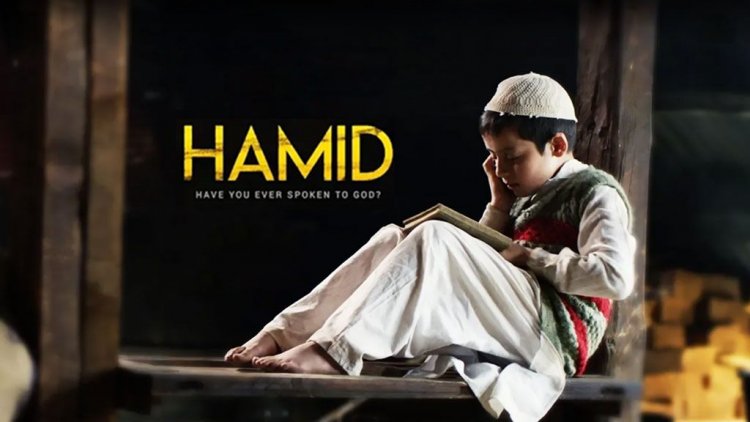Hamid

Ratings: 4/5
Director: Aijaz Khan
Cast: Talha Arshad Reshi, Rasika Dugal, Sumit Kaul
Aijaz Khan’s ‘Hamid’ is a subtle journey from anger and denial to accepting the only gift life has to offer
The movie is not another gritting tale of revolution but a romantic poem about the people who are forever ignored in the valley.

A seven-year-old boy finds out that if the number 786 is typed thrice and a 9 is placed in front of the series, he can make a call to Allah and ask for anything he wants. Among the many wishes that he could have made, he chooses to ask Allah to return his father. What happens then? Does Allah respond to his calls? Does he listen to his many questions? Do they form a bond? And most importantly does Allah return his father? Yes and no. But perhaps the lingering question which dawns upon Aijaz Khan’s ‘Hamid’ is who is at fault here? The boy who dares to dial a number that directly connects him with a CRPF officer, whom he imagines to be Allah, or the CRPF officer who remains Allah for as long as he could until one day he couldn’t?
Based on Mohammed Amin Bhatt’s play, ‘Phone No. 786’, Khan’s movie gives yet another heart-wrenching tale about the valley, only this time without the political undertone. As much as it was refreshing to watch a story that does not deal with the high seats of the political regime, Khan’s retelling has a strange dilemma hovering over it. The film picks up when Hamid’s (played by Talha Arshad Reshi) father, a craftsman by profession and a poet by passion, goes missing under unusual circumstance. Immediately the film shifts to a child who finds himself amid the ruination that has taken the valley by the grip of its throat. He has two options, to either make up his mind about his father’s death or cross the mountain and join the militants on the other side. This was the lingering dilemma that loomed large upon the story, but to Hamid these weren’t the options that would work. He finds a third one, dial up the number 786 and make a call to Allah- the one and only saviour of humankind.

Hamid picked up a third option when there were only two options lying in front of him. (Aijaz Khan/ Twitter)
While on one hand, we find a kid as young as seven-year-old using his own ideas to create an option that was far away from what society had to offer, on the other hand, we have the CRPF officer Abhay (played by Vikas Kumar). Abhay, tired of the citizen’s wrath against the army who - according to him- are solely trying to protect them, loses his temper at the drop of a hat. We are introduced to him as a man who wouldn’t mind running a bus over a Kashmiri who is simply resisting the CRPF by drawing on the street with spray paints. However, soon we are given a fatal but relatable reason behind his anger when he yells out to a friend claiming that the army is merely a victim in the tussle between the citizens and the government. You might think at this point the film is about to dive into a revealing political subplot but instead it takes a turn and begins to give us Abhay’s story as a normal citizen who is unable to get his long-due holiday sanctioned.
These two individuals from two very different points in life come together through a phone call. When Hamid dials the number, the call is immediately connected to the wrathful CRPF officer who well understands the animosity he shares with the civilians he is trying to protect. However, he is surprisingly calm and cheerful while speaking with Hamid whose incessant request to speak with his father forms the basic subject of their conversations. Throughout the movie Abhay manages to play the role of Allah that Hamid thinks him to be with utter precision, and at one point he also tries to make enquiries about Hamid’s father but quite expectedly that fails. Their conversations soon come to an end when Abhay’s only companion is killed in a probable revolution. This is the bathetic climax that the movie pulls to from where it will drop the truth on you with a thud. Abhay reluctantly reveals to a baffled Hamid about their separate alliance, and this is the point where you would expect the two wailing in rage- but once again, they don’t. On one hand, we see Hamid burying his father’s memories and moving on with life, on the other hand Abhay is no more angry with the Kashmiris who are trying to resist against the government.

Hamid finally runs out of options and finally accepts whatever has happened. (Aijaz Khan/ Twitter)
However, this entire journey from grief to denial to wrath and ultimate acceptance finds its key portrayal in Rasika Dugal’s Ishrat. As Hamid’s mother, she barely notices her boy when her husband goes missing. Throughout the movie we see her wrenched in pain and anger as she completely denies her husband’s missing can have anything to do with his death. Just like Abhay she is angry about the system but does not express it. However, she is not someone who goes to rallies with candles for the purpose of making the government notice her. Instead she seeks help from the authorities as she believes that is the right thing to do. In her attempt to keep her grief to herself, Ishrat leaves behind the society that she belongs to. What they did, how they reacted, their suffering, everything remained a black canvas where she could only see blots of her own grief.

For the longest time Ishrat denies the presence of her son and the missing of her husband. (Aijaz Khan/Twitter)
In the end, her life merges with Abhay and Hamid’s. This is where Khan actually puts his final stroke to a neat ending. Everything ends with an acceptance. While Abhay and Hamid accepted that they are not each other’s messiah, Ishrat accepts that she is not the only one at loss. The large banner with the faces of hundreds other missing men, where her husband’s face is merely a part- and not a whole- is like a waking call for Ishrat. She finally cries and holds her son, whom she has perhaps not touched in an entire year. Like Abhay, she is no more angry but accepts the flaw in her fate and embraces her son who has accepted his fate. This subtle magic that Khan produces with realism- the sheer fact that life waits for no one, and yet it is the only gift for everyone to relish.















































